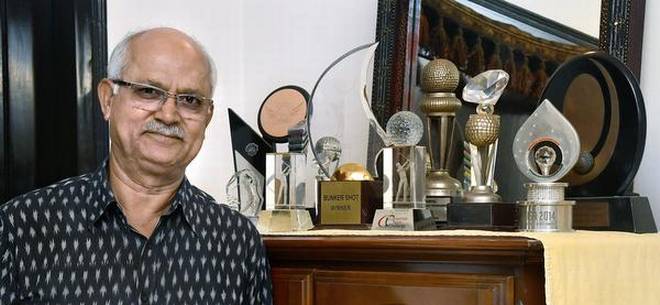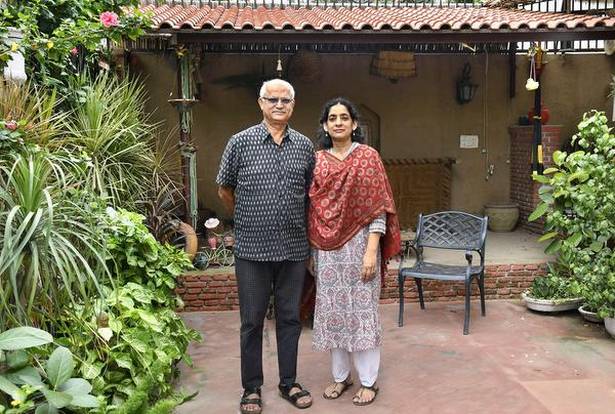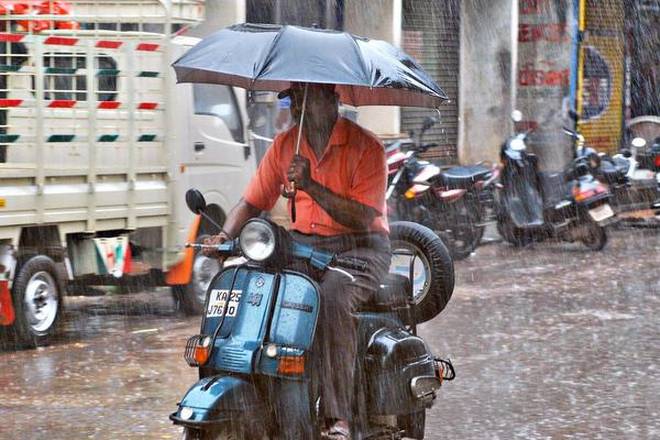Aligarh, UTTAR PRADESH / NEW DELHI / Ghazibad District (U.P) :

Hockey Olympian Zafar Iqbal on how his life has unfolded, from being the son of an academician to his days spent on the golf course today
The general impression of a hockey player in India is that of a talented sportsperson from the hinterland, modestly educated, and fighting poverty and lack of resources in the stuggle to reach the top. Zafar Iqbal breaks the mould in more ways than one.
The former Executive Director (Properties and Facilities) with the erstwhile Indian Airlines is one of the few in the sport to have managed a life outside hockey post-retirement. He credits his parents and upbringing for helping him get the balance right all through, in his articulate, but gentle manner.
“My father never stopped me from playing sports, but he was quite strict when it came to studies as well. He knew there was fame and popularity in sport; money, not so much, and so wanted us to be self-sufficient enough to manage our lives even after our sporting days were over. I am glad I listened to him,” says the 63-year old, who says he has worked enough in his life to be able to sit back and enjoy retirement.
How the world knows him
One half of the famous Shahid-Zafar pair that tormented teams’ defences for years, the talented left winger would set up the legendary Mohammed Shahid for his stylish goals. They needed little or no communication to know exactly what needed to be done.
The subtle stickwork, though, was always backed with a strong understanding of physics, thanks to his degree in civil engineering from Aligarh Muslim University and an even stronger realisation that the sport would always be his passion, but not something that would help him lead a life of comfort in the long run.

A resident of Vaishali in Ghaziabad – he moved to the house once he had retired – Iqbal’s major commitment through the day now is to golf. “I started learning golf a few years before retiring and I am still not satisfied with my game. I wake up around 4.30 in the morning and from 5.15 to almost 11.30-12, I am at the golf course. It’s the best part of my day,” he says, laughing.
As the son of Prof. Shahbuddin, dean of the science department at Aligarh Muslim University, Iqbal did not lack resources or an atmosphere of learning at home. Today, he’s surrounded by books on history that he enjoys, and has read the texts of all the major religions, including the four Vedas.
Having made his national debut in 1977, and getting his degree in 1978 – the same year he joined Indian Airlines – he was finally free to pursue hockey full-time. “That was also at my father’s insistence. I had job offers from the Indian Railways and Uttar Pradesh State Electricity Board, but he advised me to join the airlines, saying that I might not get immediate rewards but would surely be successful in the future. I realised he was right when I was finally appointed ED,” Iqbal recalls.
Players off the field
He talks about how he tried to push his teammates as well to have a life outside the sport. “I used to tell them to continue with their studies and office work after active sports, because not everyone can be a coach or administrator for life. Unfortunately, there were many, much bigger players who could not rise to a senior post. I told them it might be tough initially, but office work is no rocket science. Also, as players we are used to quick decisions on field, so it is easier for us to make the switch. They didn’t listen to me, though,” he rues.
It was in 1977 that he moved to Delhi and decided to make it his home. “For me, coming from a small town like Aligarh, Delhi was this huge, fast place where everything was big and far. In AMU everything was available at your doorstep; here, I had to travel 16 km by bus, every day, from the Indian Airlines Colony in Vasant Vihar for training at the stadium. But when I see it now, I feel it was so laid-back then,” he exclaims.
It wasn’t just the distance that awed the 22-year-old. His training camps with Indian Airlines at the National Stadium were equally overwhelming. “Players like Ashok Kumar, Aslam Sher Khan, B.P. Govinda – whose photographs we kept in our rooms and pockets – were suddenly our teammates. Inam-ur-Rehman, my idol, was the coach. He was a disciplinarian, treating everyone equally, regardless of his achievements on the field. That helped inculcate respect for the game and discipline on the field,” Iqbal admits.
The presence of other sportspeople also helped. The National Stadium, he explains, used to be a multipurpose venue with a track for athletics and no turf in the main arena. It had the likes of the legendary athlete Sriram Singh training there. “The hockey field was on the left and cricket on the right, with Bishan Singh Bedi and many more practising. It was all open and we used to interact,” he says.
Old ways
Empty roads, few vehicles, no paranoia about hygienic food or water, the absence of pollution – the Delhi he remembers is restricted to nostalgia now. Even the most secure areas of the city – in and around Parliament, which he had to cross to reach National Stadium – had easy access, including Race Course Road, which he recalls used to be open to the public back then.
“I sometimes wonder what progress we have actually made. Everyone seems to be running all the time and everyone is addicted to mobiles. We seem to have become breathing mechanical bodies,” he says.
The discipline of a sportsperson, though, continues to guide his life. Iqbal is a member of two golf courses in NCR – Army Golf Club and the Noida Golf Course – but also visits the one at Hindon. On a week-long break to Chennai to visit his son, Yasir, an assistant professor of physics at IIT, he still managed to find people who would help him play his daily round, at the Cosmopolitan Club. He hasn’t the same luck in Mumbai though, when he visits his daughter, Samia, who moved to the city for her work as a copywriter.
For the rest, he is happy to accompany wife Fauzia (who also retired from the commercial department of what was Vayudoot and consequently Air India) around or spend time occasionally with his friends.
As a member of the governing body of the Sports Authority of India, as well as consultant with the University Grants Commission in the sports curriculum committee, he has stayed in touch with sports administration, pushing the agenda of games as an essential part of the development of a person.
As a former India coach (1993-94), selector (over three tenures), and government observer for many years, he has given back to the sport that helped him become an Olympic champion. But in his pursuit of golfing excellence, Zafar Iqbal continues to live a sporting life.
This ends our 10-part series on former sportspeople who are based in Delhi.
source: http://www.thehindu.com / The Hindu / Home> News> Cities> Delhi – Now & Then / by Uthra Ganesan / September 04th, 2019









